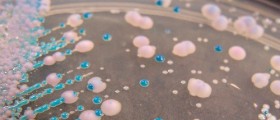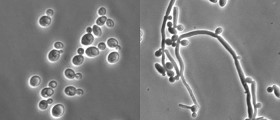Thank you so much for your kind reply.
Years ago, I also had high thyroid (TSH). It was over 7 and I got it down naturally by not eating dairy. Last I checked it was 4.15, just barely under the normal cut off range. Although I know that it's still considered high to most doctors.The only thing I changed was to stop drinking milk and having yogurt. I love cereal and have eaten it since I was a kid. I also had an entire shelf in the refrigerator dedicated to Yoplait yogurts. I stopped all dairy. It's very rare that I ingest any dairy these days, and when I do, I am very conscious and guilty of what I am doing.
So yours was confirmed that it was in fact an overgrowth of lactobacillus? Did you have a wet prep and they confirmed that that's what it was? That is one the of the few things that have not done yet. I don't have insurance where I live currently, but I will be travelling and getting any tests that have not already been done, including the wet prep. Please let me know, because then that is surely what I have too. Did they say anything else after analyzing the discharge? I thought you still didn't know what what causing your symptoms. That's great news at least if you know that it's lactobacilliosis.
Thanks again,
Adriana
Loading...
Thank you for posting. I know what you mean. I don't even remember whats it's like to have a normal vagina. And I never had any issues at all. I just never even thought about my vagina, until this happened.
We have almost the same symptoms, except my discharge is always white, never really yellow. Otherwise it's the same. Yes, it's so frustrating. Can you think of anything that happened before the onset of your symptoms? Anything at all, even if it doesn't seem likely. There has to be a common denominator among all of us with these horrible symptoms. Did you travel anywhere, or under a lot of stress, or anything at all that was out of the ordinary from your normal routine?
Thank you,
Adriana
Loading...
Loading...
Loading...
Loading...
Hi Everyone,
I finally had a wet mount done. The doctor comes back in the room and says YEAST. I was shocked. She says she took a swab from around the urethra where the irritation is and also from inside, both slides showed significant yeast. I asked how it's possible to not get a positive culture, but have it on the slide. She says she does see that sometimes. She prescribed me Terconizole 0.4% vaginal cream for 7 days, but since I was going back in a few days for the well women's visit, I didn't want to use anything. She did another wet mount and it showed NO YEAST this time, even though I had not tried any treatment. I will try the cream and see if it improves. Maybe it's a very low grade yeast that comes and goes, which causes the chronic irritation. I've also been reading about INTRACELLULAR YEAST. Where it is actually inside the cells and therefore the cultures always come back negative. However the treatment is brutal and the liver has to be monitored monthly. You can search "intracellular yeast Jorge" to learn more about it. He has many informative posts.
I also had the typical vaginitis panel done and all negative, as expected. Also, the yeast culture negative. HOWEVER, I am extremely low in Vitamin D (16) and vitamin B12 (167). Also, high folate. I wonder if there is a correlation. There is an article where a woman was cured of her chronic vulvovaginits with high doses of Vitamin D when various attempts of antibiotic usage didn't work. Search: "Treatment of Desquamative Inflammatory Vaginitis With Vitamin D: A Case Report"
I hope this helps someone. Please share your own info so we can hopefully come to some conclusion as to what is causing this.
Thank you!
Loading...
I went to an infection doctor in the meantime. I got a test - a PCR test for vaginal fluids (in a sepsis panel) and its answer was that I have gram positive bacteria in the vagina: enterococcus faecalis, streptococcus, staphylococcus epidermidis.
It was new thing for me. Gram + bacteria have never been detected before. They only test gram-negative bacteria and fungi culture. So far, doctors said that there are ovegrowth gram+ bacteria and they are lactobacilli ... yeah right.
I asked the gynecologist to repeat this analysis because the infectious doctor said that these bacteria may be "accidental". okay....
Waiting for the results now ... I think it may be aerobic vaginitis.
Oh, and I also have a low vitamin D all the time.
Thank you and looking forward to your new info.
Katy
Loading...
Hi Katy,
Thank you so much for posting. That's great information. So what happened after you took the Amoxicillin? Did it help at all? That's interesting that they found enterococcus faecalis, streptococcus, staphylococcus epidermidis. That's a good thing because it can be cured. I thought the same thing. I was sure it was aerobic vaginitis (maybe something rare like Strep A) and was so upset when the tests came back negative. I have also taken several antibiotics, all having a very targeted organism in mind. For example, Doxycycline for Mycoplasma. But nothing has worked. It has become better over the course of the year, but something is still there. It used to be more irritated and felt like splinters inside. Maybe small tears from the irritating discharge. Not sure. But that has gone away completely. It went away after I took Penicillin for 2 weeks. BUT, i was convinced it was overgrowth of lactobacillus and that the Penicillin was going to kill it all and even though I might get a yeast infection, at least it would have solved the problem. So maybe just being very relaxed thinking that I finally solved the mystery helped it get better. My father is absolutely convinced it's psychosomatic, probably caused by the extreme stress and anxiety I had from an incident that happened about a week before the symptoms appeared. Since then, it's been chronic stress and anxiety due to the incident and also now that something is wrong with my vagina. This doctor was quite knowledgeable and took the time to investigate the problem and also explain in detail. She also said that she thinks I am obsessed with this problem and could very likely be causing the symptoms with my mind. Just as a girl who is convinced she is pregnant can stop getting periods. All made by the mind.
Anyway, it will be interesting to see which medication they prescribes for you now and if they work. The answer will be in the one that works. Also, do you remember anything that happened right before your symptoms? Any stressful event, or something significant that may have happened?
Sincerely,
Adriana
Loading...
What happened with your situation? What was the conclusion, if any?
Thank you.
Loading...
Unfortunately, I'm back in round 1. Repeated analysis showed that there are no bacteria. The gynecologist also said that she no longer knows what to do ...
I no longer know should I trust her... How is it that at one point there are several different potentially harmful bacteria and not one in the next? Symptoms are still the same. Burning sensation, strange discharge ... I also have indigestion. Morning diarrhea, bloating.
The fact is that I have a Helicobacter too and I now want to go to the family doctor and still require this treatment. Maybe it solves something?
How are you doing? Have you discovered something new? Symptoms are still the same? I read about intracellular yeast too, it looks definitely interesting.
It seems that there is no easy solution ... I've suffered 10 months already. :(
Katy
Loading...
Well if you know you have H. Pylori, you should eradicate that first. I had that when I was traveling in Asia and then came home and did the treatment. I don't remember the exact protocol, but it's 2 or sometimes 3 medications for about 2 weeks. I didn't need the third one which is for the burning. But I do not have that any longer. I have been tested. I would go ahead and get that done ASAP and then see how you feel. Make sure you are not getting reinfected by a partner. That's one treatment you don't want to have to repeat.
Regarding this problem that we all have, I think it's yeast. The doctor who did the wet mount said she clearly saw yeast hyphae from both samples she took that day, one from around the urethra where the irritation is and one from inside. She said sometimes it doesn't show on the culture for whatever reason, but she can see it with her own eyes. Now I'm thinking that it was a normal yeast infection initially, but because the one Diflucan pill didn't eradicate it completely, I panicked and started taking all kinds of other medications and antibiotics and made it much worse. Not to mention the chronic panic and stress of thinking it was HSV2. It was a total nightmare. And stress is known to cause a yeast infection in the first place. I have tried the no sugar Candida diet, I mean not one molecule of sugar, grains, fruits, dairy, and also added a supplement called CandidaFX, but it's still there. I have literally tried everything. So I read about chronic vulvovaginal candidiasis. Apparently you simply need a longer treatment for it to go away completely. So I did get more Diflucan from my doctor and started last night. Higher dosage and longer period of time. I looked down there today and it's pink instead of red and it didn't burn when I peed. I did cry for a few minutes of happiness that I may have finally found the answer. But let me see how it goes and I will update.
I also found this review of Dilfucan from someone who seemed to be going through a similar situation.
"I have recurrent vaginal yeast infections (Candida albicans) that are difficult to treat. I've been on a number of different protocols with this med. First it was the standard 1x150mg, then it was 150mg followed by 150mg three days later, next it was 100mg ever other day for a month, however, the only thing truly effective was 200mg twice a week for 6 months. This stuff works, it sucks that it took a specialist gyno who only deals with vaginitis cases to finally implement what worked. For anyone wondering, I asked this Dr about the candida diets and whatnot, and was told the diets and cleanses are BS. Anyway, the medication works, but only when you find the correct regime for taking it."
This is when I did more research and asked my doctor. He also did research and said it was a good idea to try. So that is where I stand now.
I also read something else interesting. That other types of yeast do not have the classic yeast hyphae under the microscope. This is good news because those others can be more resistant to treatment (Diflucan) than Candida Albicans, the most common strain. So it seems that in this case, the Diflucan should work.
I hope this helps!
Sincerely,
Lisa
Loading...
Hi Lisa,
Thank you for your post. I think it's yeast as well. I believe we have an overly aggressive form of it which has grown out of control. Especially for those of us that have been dealing with this for years. I've been able to minimize my discomfort a lot this year by adjusting my diet drastically. I've been primarily plant based but as soon as I eat something processed, or something high in fat or sugar...my symptoms return full force.
After reading your post, I did research as well and came across this article, https://medicinetoday.com.au/system/files/pdf/medicine_today/article/MT2014-02-033-FISCHER.pdf. I printed the article, highlighted my symptoms and talked with my ob/gyn last week and we decided I should do the 6 month treatment of diflucan.
I've completed one week but I wanted to check with you to see how your symptoms are progressing. Are they getting better?
-M
Loading...
Excellent! Thank you for your post! Interestingly enough, I also did the long term Diflucan for the same reason. After much research, and after one doctor said she saw YEAST HYPHAE on the slide, then I figured it would be worth a try. I also found this written by someone else:
"I have recurrent vaginal yeast infections (Candida albicans) that are difficult to treat. I've been on a number of different protocols with this med. First it was the standard 1x150mg, then it was 150mg followed by 150mg three days later, next it was 100mg ever other day for a month, however, the only thing truly effective was 200mg twice a week for 6 months. This stuff works, it sucks that it took a specialist gyno who only deals with vaginitis cases to finally implement what worked. For anyone wondering, I asked this Dr about the candida diets and whatnot, and was told the diets and cleanses are BS. Anyway, the medication works, but only when you find the correct regime for taking it."
So, I spoke to my primary doctor and he agreed and prescribed something similar. I took 225mg (1 and half pills) three times the first week, and twice a week thereafter for over a month. Surely enough, the white pasty discharge is gone. However, the irritation, redness and burning with urination is still there. Also, I could smell a very slight fishiness, but had to really try to find it. So I assumed BACTERIAL VAGINOSIS. So I ordered Potassium Hydroxide to perform the "whiff test" at home. You drop a couple drops onto the discharge, and if it releases a fishy smell, then that's a major indicator of BV. The anaerobic bacteria release byproducts that smell fishy. Sure enough, it was definitely positive.
Unfortunately, most doctors don't do any of the old school testing to determine BV.
"In clinical practice, bacterial vaginosis is diagnosed by the presence of three out of four Amsel criteria:
- Thin, homogenous vaginal discharge
- Vaginal pH greater than 4.5
- Positive whiff test (fishy amine odor when 10 percent potassium hydroxide solution is added)
- At least 20 percent clue cells (vaginal epithelial cells with borders obscured by adherent coccobacilli on wet-mount preparation or Gram stain"
These days, doctors just send in swabs and wait for the results. But this is the problem:
'Sending swabs to the standard laboratory is only any good for thrush and the sexually transmitted diseases. It is no good for diagnosing BV,' says Dr Blackell. 'As a result, most women are reassured that nothing is wrong when there may be potentially serious consequences," (search "health-all-may-not-be-as-it-seems-a-serious-condition-in-women-is-often-diagnosed-as-a-harmless-case") for the article.
In addition, many doctors think only Gardernella causes BV, when in fact there are many ANAEROBIC BACTERIA that cause BV! So when the tests come back negative, that is not always accurate. And obviously, if there is an inflammatory response, redness and irritation, then obviously something is the cause. Search: "Identification and Antimicrobial Susceptibility Testing of Anaerobic Bacteria: Rubik’s Cube of Clinical Microbiology?" And scroll down to TABLE 1. There are many bacteria and not all are susceptible to Metronidazole, which is the first drug of choice for BV.
In my case, I believe that this was a mixed infection of yeast and BV. And all of the desperation of not being able to find a cause, and therefore trying different medications, had complicated matters. Not to mention the chronic stress of this entire ordeal. And since I have never had any type of vaginal infection before, I didn't have any frame of reference for comparison.
Because after all, there are only a few causes of vaginitis:
Yeast
Viral (HSV)
Bacteria (aerobic/anaerobic)
STIs (chlamydia, trichomoniasis, gonorrhea)
Contact Dermatitis (such as from chemicals or allergies)
Atrophic vaginitis
So once you rule out viral, yeast, STIs, detergents, etc, then you pretty much just have an diagnosed bacterial infection that is probably resistant to the antibiotics you've taken. There are not many other options left. Plus, one of the main causes of BV, is a new sexual partner. And that is precisely when this happened to me.
So for me, now that the pasty white discharge is gone, I am taking oral Clindamycin, 300mg twice daily for a week. I took Flagyl when this all began and it didn't help. And the other medication that is routinely given for BV is Clindamycin. My hypothesis is that this will eradicate the anaerobic bacteria that are causing the irritation and that were not susceptible to Flagyl. I will update my results soon. I really hope this information helps someone!
Sincerely
Loading...
Even if you haven't found the right treatment, I'm still looking forward to your updates.
Thank you
Katy
Loading...
In looking for a corelation among all of us with these symptoms, I wanted to know how many of us are ingesting ARTIFICIAL SWEETENERS?
There are some studies that show that these chemicals in sugarless gum and soda can disrupt the natural balance and good bacteria in our gut, and I'm assuming in our vagina as well.
I used to avoid anything artificial, and still do for the most part, but I do remember that I was chewing a lot of Mentos Gum, those with the hard shell. The ingredients are horrific. But I would go out a lot, and also working in sales, and I think I was chewing these things like crazy all day without even realizing.
Please post if you have a habit of ingesting artificial sweeteners in any form.
Thank you!
Adriana
Loading...

















